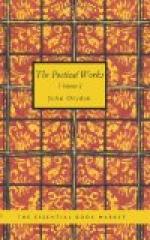Sheva—Sir Roger Lestrange.
Shimei—Slingsby Bethel,
Sheriff of
London in 1680.
Sion—England.
Solymaean Rout—London Rebels.
Tyre—Holland.
Uzza—Jack Hall.
Zadoc—Sancroft, Archbishop
of
Canterbury.
Zaken—A Member of the
House of
Commons.
Ziloah—Sir John Moor,
Lord Mayor
in 1682.
Zimri—Villiers, Duke of Buckingham.
* * * * *
FOOTNOTES:
[Footnote 67: ‘Annabel:’ Lady Ann Scott, daughter of Francis, third Earl of Buccleuch.]
[Footnote 68: ‘Adam-wits:’ comparing the discontented to Adam and his fall.]
[Footnote 69: ‘Triple bond:’ alliance between England, Sweden, and Holland; broken by the second Dutch war through the influence of France and Shaftesbury.]
[Footnote 70: ‘Vare:’ i.e., wand, from Spanish vara.]
[Footnote 71: ‘Him:’ Dr Dolben, Bishop of Rochester.]
[Footnote 72: ‘Ruler of the day:’ Phaeton.]
[Footnote 73: The second part was written by Mr Nahum Tate, and is by no means equal to the first, though Dryden corrected it throughout. The poem is here printed complete.]
[Footnote 74: ‘Next:’ from this to the line, ’To talk like Doeg, and to write like thee,’ is Dryden’s own.]
[Footnote 75: ‘Who makes,’ &c.: a line quoted from Settle.]
* * * * *
THE MEDAL.[76]
A SATIRE AGAINST SEDITION.
EPISTLE TO THE WHIGS.
For to whom can I dedicate this poem with so much justice as to you? It is the representation of your own hero: it is the picture drawn at length, which you admire and prize so much in little. None of your ornaments are wanting; neither the landscape of your Tower, nor the rising sun; nor the Anno Domini of your new sovereign’s coronation. This must needs be a grateful undertaking to your whole party; especially to those who have not been so happy as to purchase the original. I hear the graver has made a good market of it: all his kings are bought up already; or the value of the remainder so enhanced, that many a poor Polander, who would be glad to worship the image, is not able to go to the cost of him, but must be content to see him here. I must confess I am no great artist; but sign-post painting will serve the turn to remember a friend by, especially when better is not to be had. Yet, for your comfort, the lineaments are true; and though he sat not five times to me, as he did to B., yet I have consulted history, as the Italian painters do when they would draw a Nero or a Caligula: though they have not seen the man, they can help their imagination by a statue of him, and find out the colouring from Suetonius and Tacitus. Truth is, you might have spared one side of your Medal: the head would be seen to more advantage if it were placed on a spike of the Tower, a little nearer to the sun, which would then break out to better purpose.




